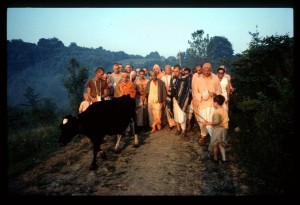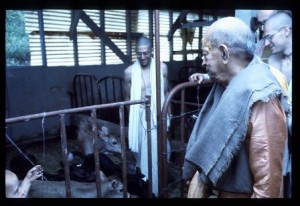04.01.2015 H.G.Vaisakhi Prabhu_SB- 06.04.12
04.01.2015 H.G.Vaisakhi Prabhu_SB- 06.04.12
Draupadi – dishonored yet honorable
→ The Spiritual Scientist
Draupadi. Her admirable character is revealed in the most humiliating incident of her life – her disrobing by the wicked Dushasana. Though victimized in body, she refuses utterly to be victimized in her heart.
By her exceptional character, the lowest point in her life turns out to be the highest point. The incident in which she is the most dishonored, she emerges as the most honorable.
On that dark day, her period has just ended and she has emerged after bathing, wearing a single cloth before she puts on her royal dress as the chief queen of the reigning monarch. Unknown to her, the monarch Yudhisthira has, in a rigged gambling match, lost everything, including all his property, his brothers, himself and finally his wife Draupadi.
The jeering Karna suggests that Draupadi be brought into the assembly and be disrobed publicly for she was now the Kauravas’ slave, meant to do their bidding. If the Kauravas had succeeded in disrobing her, whether they would have physically violated her in the public assembly is doubtful. The atrocious idea was not just driven by lust but by power play – the Kauravas saw Draupadi not as a person, but as a tool to demean the Pandavas. Objectification of women runs through and through in the mentality of the Kauravas. They order a court messenger to summon Draupadi to the palace.
When the messenger informs her that she has been summoned to the assembly and tells her all that has transpired there, she is aghast. But pulling herself together with amazing speed, she comes up with a strategy to buy time. She tells the messenger to ask the assembly whether she had been rightly gambled and lost when Yudhishtira had already gambled and lost himself – when he was not his own master, was he her master to have gambled her?
While the fact that Yudhisthira gambled Draupadi might suggest that women were treated as property and were thus objectified, the sequence of the events reveals a much more nuanced reality. Yudhisthira gambles her after he has gambled himself, whereas he gambles all his property before. So Draupadi, even if she is considered to be his property, is of a drastically different level than all the objects that were his property – she is more precious than not just all those things, but more precious than he himself. Rather than using the word ‘property’, the right word is ‘belonging.’ In love, the two lovers often say two each other: “You are mine; you belong to me.” Such statements by a lover makes the beloved feel valued, treasured, cherished.
When the messenger conveys Draupadi’s message to the assembly, the Kauravas demand that Draupadi come and ask that question herself. When she asks again through the messenger whether the righteous assembly had actually summoned her, a chaste woman to come in her condition to the assembly, Dushasana goes to her palace and drags her by her hair.
Draupadi, though distraught, offers her respect to the assembly and requests that it answer whether she still belonged to Yudhisthira if Yudhisthira was not his own master. Bhishma confesses his confusion over two principles saying that a wife always belongs to her husband, whereas nothing belongs to a slave. No one in the assembly offers any other opinion except Vidura who is paid no heed. It seems that the whole assembly, getting caught in a technicality, ends up condoning a travesty.
Duryodhana, enjoying the Pandavas’ fury, tries to pit wife against husband by announcing that if Draupadi admits that dharma-raja Yudhisthira had violated dharma by gambling her, he would release them all. She doesn’t take Duryodhana’s bait. She refuses to cast any blame on her husband, not because he is blameless – which he certainly isn’t – and not because she is so foolish or so madly in love with him as to not see his mistake, but because her sense of honor inspires her to stand by her loved ones in public. Just because we are let down by others doesn’t mean that we have to let them down. She answers that if it had been Yudhisthira’s choice he wouldn’t have gambled at all – he had gambled only because his elders had instructed him to. The onus was no those elders to decide what was right.
Draupadi is holding on to straw and she probably knew it. But when straw is all that there is to hold on to, then it needs to be held on to firmly.
The whole incident is way too long to be described and analyzed here, and I want to focus on Draupadi here, so I will skip some of the details.
Vidura has been forcefully opposing the outrage, but his words have fallen on deaf ears. The disrobing is so heinous an act that it triggers dissension among the Kauravas. One of Duryodhana’s brothers, Vikarna, rises and asks the assembly to respond to Draupdi’s question. When no one offers a response, he points out three flaws: the match was improper because Yudhisthira had been pitted against a trained gamester; he had been first compelled to gamble by his elders’ instruction and later incited to keep gambling till the gambling went far beyond civilized limits; and he had lost himself first, so he was in no position to stake Draupadi. The assembly applauds Vikarna, but Karna crushes the dissenting Kauarva, mocking him as a child who doesn’t know morality. Rather than rationally refute Vikarna, Karna inexplicably chooses to fight dirty by assassinating Draupadi’s character, calling her a prostitute for having married five men.
A prostitute sells her body to gain money. While Draupadi’s polyandry is a different subject, suffice it to say that she never went out to sell her body to anyone. Her getting five husbands, instead of one, as was the standard at that time, was not due to any of her doing; it was due to the actions of her elders and ultimately of forces greater than human.
For his grievous insult to an honorable woman, Karna deserves the censure of anyone who has the slightest respect for women. That the insult had no basis in fact makes it so much worse.
With Vikarna silenced, Duryodhana asks his brother Dushasana to strip Draupadi. She resists desperately, but she is no match to that huge brute. Raising her hands in supplication to her Lord, Krishna, she begs him to rescue her from sinking in the Kaurava ocean. By Krishna’s mystic power, her saree becomes endless and Dushasana keeps pulling her saree and gets exhausted, but Drauapdi remains covered.
The whole assembly applauds Draupadi’s chastity that has attracted such supernatural protection and they censure the Kauravas for dishonoring such a glorious lady. This incident of Draupadi calling out to Krishna and being rescued by her Lord who incarnated as the endless saree has been immortalized by the bhakti tradition through architecture and literature, poetry and imagery, prayer and song.
This supernatural intervention is definitely significant, but it shouldn’t detract from the strength of character that Draupadi exhibits throughout the incident.
It is her devotion, her spirituality, that has given her that strength of character and that foundational devotion also gets its culminational expression in her helpless prayer to Krishna and his miraculous rescue.
Significantly, the Mahabharata itself doesn’t focus on the supernatural intervention – it goes on describing the natural interaction among the characters. This is not surprising because the Mahabharata’s focus is on the question of what is dharma, and the answer centers on how we act, not how God responds.
Curiously but perhaps unsurprisingly, their inability to disrobe Draupadi doesn’t make the Kauravas give up their evil disposition – it just makes them suspend their intention to disrobe Draupadi. Rather than seeing that they are doing something wrong or that they might be angering higher powers by their misdeeds, they simply change their plan.
They keep insulting the Pandavas and Draupadi. And then they decide she should go to the maids’ quarters and start sweeping the Kauravas’ palace.
As the Kauravas keep trading insults at the Pandavas and their wife, other inauspicious omens occur. Vidura warns Dhritarashtra that such omens portend the destruction of the Kuru dynasty and implores him to stop the adharma that is provoking such reactions.
The king is jolted out his stupor on hearing that his sacrificial fire, which he had kept lit throughout his life has gone off. Coming to his senses, he attempts a last moment damage minimization. He lauds Draupadi for her chastity and courage, and tries to minimize the Pandavas’ anger with sweet words.
The baldness of his lies would have attracted laughter had the situation not evoked such horror. He says that he had called the gambling match just to test the skills of the two cousins. How were the Kauravas’ skills tested by having Shakuni gamble for them? It’s like two cousins who claim to be playing a friendly boxing match and then one of the friends has Mike Tyson play in his stead and Mike Tyson fights with a win-at-all-costs approach.
Still, when Dhritarashtra asks Draupadi for some boon, she asks for the release of her husband – not Arjuna who had won her, but Yudhisthira who had lost her.
Even in the closest of relationships, we all commit mistakes, and most of us do have conscience that makes us feel bad when we act badly. That pinch of conscience alone is enough for sensitive people to correct themselves. But when those who are hurt by our mistakes put salt on our wounds by their harsh words, that additional threat often puts us in an ultra-defensive mode instead of a self-corrective mode. Draupadi resists the temptation to put any salt on Yudhisthira’s wounds and helps the mortified king regain his dignity.
Dhritarashtra tells her to ask for some other benediction. Draupadi asks that all her husbands be released along with their weapons, saying that with those weapons they would regain everything else. The king says that he is not satisfied and tells her to ask for more benedictions. When Draupadi declines, quoting an ancient standard forbidding kshatriya woman from asking more than two benedictions. The king in a rare display of magnanimity returns the Pandavas everything they had lost. (Later they are recalled for another gambling match after which they are exiled to the forest.)
Karna can’t tolerate this foiling of the scheme to dishonor the Pandavas.
Fanciful retellings of the Mahabharata depict Draupadi and Karna having a secret, unfulfilled love for each other. They couldn’t have got the Karna-Draupadi relationship more wrong. What kind of lover would suggest that his beloved be stripped in public?
The moment when the Pandavas regain what they have lost is Draupadi’s one moment of dignity, even glory, in a nightmare of indignity. And yet Karna cannot let her have even that much. He can’t resist taking a potshot at the Pandavas: here are the warriors who were saved by a woman. His words reveal an utterly demeaning attitude towards women as if they are good for nothing and if they are good for something, then that makes the men good for nothing.
In this incident, Draupadi is undoubtedly the heroine – she emerges the brightest. The character who emerges the darkest is not Dushasana, although he gets immortalized infamously as the stripper of Draupadi. The darkest character is not Duryodhana, whose exhibiting his naked thigh to Draupadi eventually leads to his death through the breaking of that very thigh. The darkest character is Karna. He emerges the darkest not just because he behaves so badly, but because such depraved behavior is so shockingly out-of-character for him. To his credit, he regrets his actions, as he admits in later parts of the Mahabharata while speaking to Kunti and then to Bhishma. In contrast, there’s no indication in the Mahabharata of Duryodhana or Dushasana regretting their vile deeds – their only regret was that they couldn’t dishonor the Pandavas and Draupadi as much as they would have liked to. Just as in the Ramayana Kaikeyi acts reprehensibly due to Manthara’s association, so too does Karna act reprehensibly by Duryodhana’s association, being driven by the desire to please that debauched prince.
Draupadi’s mystical rescue by Krishna is often seen as the highlight of this incident. An equally, if not more, important feature is Draupadi’s consistent strength of character. That mystical rescue is not usually available for those threatened or dishonored. But what redeems Draupadi is not just the mystical rescue, but her steely resolve throughout the incident. Within her frail female form runs a spine of steel that stands erect throughout. That steely resolve is something that all women, and indeed all of us, can aspire for, no matter what indignity the world subjects us to.
Certainly, the world needs better systems for the protection of women. Today when such systems are often found distressingly inadequate, this ancient incident when the system of protection utterly fell apart speaks to all of us. Draupadi reveals the strength that comes from one’s innate dignity, by sheltering one’s identity not in one’s feminity, but in one’s spirituality.
Who can not admire such character and admire the character with such character?
The post Draupadi – dishonored yet honorable appeared first on The Spiritual Scientist.
Daily Darshan : January 8th, 2016
→ Mayapur.com
The post Daily Darshan : January 8th, 2016 appeared first on Mayapur.com.
ISKCON 50 Meditations: January 8, 2016
→ ISKCON News
Gita 08.14 – What is difficult in one perspective is easy in another perspective
→ The Spiritual Scientist
Gita verse-by-verse study Podcast
Download by “right-click and save content”
The post Gita 08.14 – What is difficult in one perspective is easy in another perspective appeared first on The Spiritual Scientist.
Bhagavatam study 30 – 1.7.15 -21 – Arjuna pacifies griefstruck Draupadi with fierce sweet words
→ The Spiritual Scientist
At Anna-Loka restaurant in Cardiff
→ SivaramaSwami.com
The post At Anna-Loka restaurant in Cardiff appeared first on SivaramaSwami.com.
Devotee Prasadam Business
→ Ramai Swami
Nimainanda, his wife Sucitra and his son Kunaal live in Auckland and attend New Varshana regularly. For a time Nimainanda lived on the farm and was the head cook.
Some years ago the family started “Gopal,” a business that supplies yoghurt, ghee, paneer and other products to grocery stores and now to supermarkets all over New Zealand.
By Krishna’s mercy, it has become very successful.
Dhanavira gives a mrdanga presentation
→ SivaramaSwami.com
The post Dhanavira gives a mrdanga presentation appeared first on SivaramaSwami.com.
Do you think sex is bad?
→ KKSBlog
(Kadamba Kanana Swami, November 2015, Vrindavan, India, Video Interviews)
The essence is to consider the goal of life. When we think that sex is the goal of life, then sex is bad because then sex will be engaged in only on the basis of lust and day-by-day, we will become more and more bound up in material existence and in the suffering that the material world brings.
But when we understand that Krsna is the goal of life and we engage in sexual activities according to his direction, then we are engaging according to the injunctions of the Bhagavad-gita, in accordance with religious principles, as it is authorized by Krsna. Such sexual activity is very nice and purifying. So to say that sex is bad would not be true.
Sunday, January 3rd, 2015
→ The Walking Monk
Cooperate
In other words, cooperate.
Some quotes I like on the topic are:
Saturday, January 2nd, 2016
→ The Walking Monk
Walking was an actual pacing in the temple this morning.
Singing was about
Speaking entailed describing His shark-shaped earrings.
Greeting involved a return of two pilgrims from
Sleeping was napping before being taken to a home program.
Eating took the form of Chinese-style food. Yum!
Speaking at this home covered the topic of the name Vasudeva.
Being driven meant napping for lack of sleep last night.
Attending an engagement involved blessing a he and a she.
Eating again meant refusing lots of goodies, a monk’s pride.
Being driven to the temple involved speaking about the environment.
E-mailing was addressing a cancer discovered by monk Gunagrahi.
Chanting for his well-being gives reassurance to him.
Sleeping with no hope meant picking up a pen.
Writing to add to a new script was a creative outlet.
Answering the phone at 1AM came from Andrew and Dakota.
Answering their questions gave me a boost.
Delving into another day is quite exciting.
Getting surprises and adventure is to die for.
Having no regrets about this life because it’s a privilege.
May the Source be with you!
4 km
Srila Prabhupada & Kaliya, ISKCON’s First Cow
→ New Vrindaban

Prabhupada in New Vrindaban with Kaliya Cow 1976.
Written by Madhava Smullen. Archival Research by Chaitanya Mangala.
There’s no doubt that protecting cows was very close to Srila Prabhupada’s heart.
In a series of Back to Godhead magazine articles in the mid 1950s, he was already envisioning a community where residents lived a simple life and protected cows.
Soon after registering ISKCON in New York in 1966, he began requesting his disciples to start a rural community, asking them to call it “ISKCON-Nagari or New Vrindaban.”
And when Hayagriva Das, Kirtananda Swami and a handful of other devotees began New Vrindaban, ISKCON’s first farm, in 1968 in the hills of West Virginia, he urged them to keep cows and bulls there, and to maintain them comfortably throughout their natural lives as their proverbial mothers and fathers.
The cow’s milk could be used to create all kinds of staple foods, and their dung dried and used as fuel, he explained. Bulls could pull plows to till the ground for food grains. Together, they offered the chance of a peaceful, self-sufficient life free from the modern world’s stressful rat race and favorable for advancing in Krishna consciousness.
What’s more, he explained to Hayagriva in one of his first letters about New Vrindaban’s development, caring for cows was what Lord Krishna did every morning in Goloka Vrindavana. “Krishna by His practical example taught us to give all protection to the cows, and that should be the main business of New Vrindaban,” he said.
Prabhupada continued to write the New Vrindaban devotees nearly every month, espousing the benefits of cow protection along with outright entreaties for action.
“I am anxiously awaiting receipt of your first cow,” he wrote to Shyama Dasi in March 1969. And in April: “I hope you will soon be getting a cow for New Vrindaban. Vrindaban without cows does not look well, so we must have many cows as soon as possible.”

Kaliya the Cow New Vrindaban 1971
Devotees were glad to have finally purchased their first cow by the time Srila Prabhupada first visited New Vrindaban in May 1969. A black Jersey with a white mark on her forehead where Vaishnavas wear their tilak, she was named Kaliya, or “black,” by Prabhupada himself.
One of the first things the “Brijabasis” did when Prabhupada arrived was offer him a seat beneath a willow tree, and bring him fresh milk from Kaliya. They then sat around him in a semi-circle on the grass, looking up at him expectantly as he raised the cup to his lips.
Prabhupada was delighted. “I haven’t tasted milk like this in fifty years,” he said.
Excited at pleasing their spiritual master, the devotees brought Kaliya to meet him. Ranadhir Das paraded her before him, and Prabhupada admired her. “We don’t have such fatty cows in India,” he said. “In days past, yes, but now no one can feed them nicely. That is the way the Vedas calculate a man’s wealth—in cows and grains.” He even walked out to the barn to watch Ranadhir put Kaliya back in her stall.
During his visit, which lasted a whole month, Prabhupada continued encouraging the devotees, meeting with community leaders to discuss growing their herd from one to fifty. One cow’s milk could be shared by at least ten people, he said; or if each resident had their own cow, they could sell excess milk products and “get other necessities of life in that way.”
New Vrindaban and Kaliya stayed on Prabhupada’s mind after his visit. “I am always thinking of your New Vrindaban,” he wrote from Los Angeles just two days after leaving. “The first thing I find is the taste of the milk. The milk which we are taking here is not at all comparable with New Vrindaban milk.” He even offered to help finance more cows for the community.
Over the next few months and years, Prabhupada greatly enjoyed receiving in the mail curd cheese and milk sweets made from dairy provided by New Vrindaban’s protected cows; and he guided devotees in how to prepare them. “The whole idea of New Vrindaban is that men who are living there should produce their own food, of which milk is the principal thing,” he wrote.
After visiting New Vrindaban again in September 1972 to deliver a series of Bhagavat Dharma discourses, he was clearly enlivened by the progress he had seen. “I can see that Krishna is giving you more and more facility for developing this New Vrindaban scheme,” he said. “So this is very nice. I am very pleased that you have acquired some more cows.”
But he also cautioned the devotees not to forget about the bulls. “The cow is so wonderful and valuable in society,” he wrote. “But you should also use the bulls by engaging them in tilling the ground. People may call this the primitive way but it is very practical for engaging the bulls.”

Bulls 1976
By the time Prabhupada visited New Vrindaban again in July 1974, its cow protection program was thriving. There were 100 cows spread across three farms – Bahulaban, Vrindaban and Madhuban – including sixteen milking cows who produced over 600 gallons of milk per week. A fourth farm, Nandagram, housed young oxen, and three ox teams were being trained.
Prabhupada visited the Bahulaban barn, walking down its length and closely observing the cows on either side. He stopped at Shukla, whose milk he had also drank, and patted her on the head. He then observed the cow Satyabhama being milked, and when told that she was giving nine gallons daily said to cowherd Devakinandana Das, “You are doing wonderfully here.”
After his visit, Prabhupada wrote that he was “very happy” while in New Vrindaban and enjoyed the atmosphere, “especially the cow protection scheme.”
He continued to encourage the devotees to build a farm community that would set an example for how to treat cows: “Let other farms see… how we derive benefit from them and that will be the living example to persons who are using cow flesh rather than cow milk.”
In 1976, when he visited New Vrindaban for the last time, the community was caring for four working teams of oxen and over 150 cows. A new barn had been erected in Bahulaban, and Prabhupada visited it to see the cows and four new-born calves. He let one of them lick his hand as a devotee told him how the cows were yielding about 120 gallons of milk every day, which they were turning into ghee, cheese and buttermilk. Prabhupada was pleased.
But there was one cow he still hadn’t seen. Kaliya, now fourteen years old, was the retired matriarch of New Vrindaban’s herd. She had given birth to eight calves herself, and up until the previous year, had still been producing about six gallons of milk a day for the Lord and the devotees – despite having maladies common to aging cows of her breed, such as blindness in one eye and respiratory problems.
Writing in Brijbasi Spirit magazine, cowherd Amburish Das described how Kaliya – the smallest cow in New Vrindaban at 800 pounds – never pushed and shoved to eat grain as the other cows did, but stood patiently waiting her turn. “There may be some mild cows, but Mother Kaliya is even more than mild – she is a devotee,” he said. “Her humility is unmatched.”

Prabhupada Views Calves in New Vrindaban 1976
This rare soul was finally reunited with Srila Prabhupada after seven years in a meeting that left an indelible mark in the minds and hearts of those who witnessed it.
Towards the end of his visit, Prabhupada walked with a large group of devotees to go see Sri Sri Radha Vrindaban Nath in the farmhouse temple at the old Vrindaban farm, where Kaliya resided. It was a beautiful morning, the rays of the rising sun shining hazily through a light mist.
As Prabhupada rounded a curve and spotted the Vrindaban farmhouse in the distance, one of the devotees, Advaitacarya Das, pointed to a small herd of cows far up at the top of “Govardhana Hill,” which rose to their left. “Srila Prabhupada, look!” he said. “There’s Kaliya. She’s our first cow. You used to drink her milk.”
Suddenly, as Prabhupada looked up at her, Kaliya broke away from her herd and made her way alone down the steep bank. Matching the devotees’ pace, she stepped out right in front of Srila Prabhupada, and began walking with him as if she were his pet calf.
“Ah,” Srila Prabhupada said simply. “My dear old friend Kaliya.”
She continued to walk with him for some time, a quiet connection hanging between them that the devotees all felt. Then, finally Kaliya picked up her pace and disappeared over the horizon.
“For me, it was a mystical experience,” says Advaita. “Srila Prabhupada was always preaching that we’re all trying to get to Vrindavana, where Krishna and his cowherd boy friends are eternally playing and taking care of the cows. And to see Kaliya come down the hill and walk with him like that just made it all very real.”
After this last visit to New Vrindaban, Prabhupada continued to encourage his followers to establish cow protection programs all over the world. And to all of them, he gave New Vrindaban as the model farm community to emulate – the home of Kaliya, the “Queen of New Vrindaban,” and ISKCON’s very first cow.
Srila Prabhupada & Kaliya, ISKCON’s First Cow
→ Dandavats

Written by Madhava Smullen. Archival Research by Chaitanya Mangala.
There’s no doubt that protecting cows was very close to Srila Prabhupada’s heart.
In a series of Back to Godhead magazine articles in the mid 1950s, he was already envisioning a community where residents lived a simple life and protected cows.
Soon after registering ISKCON in New York in 1966, he began requesting his disciples to start a rural community, asking them to call it “ISKCON-Nagari or New Vrindaban.”
And when Hayagriva Das, Kirtananda Swami and a handful of other devotees began New Vrindaban, ISKCON’s first farm, in 1968 in the hills of West Virginia, he urged them to keep cows and bulls there, and to maintain them comfortably throughout their natural lives as their proverbial mothers and fathers.
The cow’s milk could be used to create all kinds of staple foods, and their dung dried and used as fuel, he explained. Bulls could pull plows to till the ground for food grains. Together, they offered the chance of a peaceful, self-sufficient life free from the modern world’s stressful rat race and favorable for advancing in Krishna consciousness.
What’s more, he explained to Hayagriva in one of his first letters about New Vrindaban’s development, caring for cows was what Lord Krishna did every morning in Goloka Vrindavana. “Krishna by His practical example taught us to give all protection to the cows, and that should be the main business of New Vrindaban,” he said.
Prabhupada continued to write the New Vrindaban devotees nearly every month, espousing the benefits of cow protection along with outright entrities for action.
“I am anxiously awaiting receipt of your first cow,” he wrote to Shyama Dasi in March 1969. And in April: “I hope you will soon be getting a cow for New Vrindaban. Vrindaban without cows does not look well, so we must have many cows as soon as possible.”
Devotees were glad to have finally purchased their first cow by the time Srila Prabhupada first visited New Vrindaban in May 1969. A black Jersey with a white mark on her forehead where Vaishnavas wear their tilak, she was named Kaliya, or “black,” by Prabhupada himself.
One of the first things the “Brijabasis” did when Prabhupada arrived was offer him a seat beneath a willow tree, and bring him fresh milk from Kaliya. They then sat around him in a semi-circle on the grass, looking up at him expectantly as he raised the cup to his lips.
Prabhupada was delighted. “I haven’t tasted milk like this in fifty years,” he said.
Excited at pleasing their spiritual master, the devotees brought Kaliya to meet him. Ranadhir Das paraded her before him, and Prabhupada admired her. “We don’t have such fatty cows in India,” he said. “In days past, yes, but now no one can feed them nicely. That is the way the Vedas calculate a man’s wealth—in cows and grains.” He even walked out to the barn to watch Ranadhir put Kaliya back in her stall.
During his visit, which lasted a whole month, Prabhupada continued encouraging the devotees, meeting with community leaders to discuss growing their herd from one to fifty. One cow’s milk could be shared by at least ten people, he said; or if each resident had their own cow, they could sell excess milk products and “get other necessities of life in that way.”
New Vrindaban and Kaliya stayed on Prabhupada’s mind after his visit. “I am always thinking of your New Vrindaban,” he wrote from Los Angeles just two days after leaving. “The first thing I find is the taste of the milk. The milk which we are taking here is not at all comparable with New Vrindaban milk.” He even offered to help finance more cows for the community.
Over the next few months and years, Prabhupada greatly enjoyed receiving in the mail curd cheese and milk sweets made from dairy provided by New Vrindaban’s protected cows; and he guided devotees in how to prepare them. “The whole idea of New Vrindaban is that men who are living there should produce their own food, of which milk is the principal thing,” he wrote.
After visiting New Vrindaban again in September 1972 to deliver a series of Bhagavat Dharma discourses, he was clearly enlivened by the progress he had seen. “I can see that Krishna is giving you more and more facility for developing this New Vrindaban scheme,” he said. “So this is very nice. I am very pleased that you have acquired some more cows.”
But he also cautioned the devotees not to forget about the bulls. “The cow is so wonderful and valuable in society,” he wrote. “But you should also use the bulls by engaging them in tilling the ground. People may call this the primitive way but it is very practical for engaging the bulls.”
By the time Prabhupada visited New Vrindaban again in July 1974, its cow protection program was thriving. There were 100 cows spread across three farms – Bahulaban, Vrindaban and Madhuban – including sixteen milking cows who produced over 600 gallons of milk per week. A fourth farm, Nandagram, housed young oxen, and three ox teams were being trained.
Prabhupada visited the Bahulaban barn, walking down its length and closely observing the cows on either side. He stopped at Shukla, whose milk he had also drank, and patted her on the head. He then observed the cow Satyabhama being milked, and when told that she was giving nine gallons daily said to cowherd Devakinandana Das, “You are doing wonderfully here.”
After his visit, Prabhupada wrote that he was “very happy” while in New Vrindaban and enjoyed the atmosphere, “especially the cow protection scheme.”
He continued to encourage the devotees to build a farm community that would set an example for how to treat cows: “Let other farms see… how we derive benefit from them and that will be the living example to persons who are using cow flesh rather than cow milk.”
In 1976, when he visited New Vrindaban for the last time, the community was caring for four working teams of oxen and over 150 cows. A new barn had been erected in Bahulaban, and Prabhupada visited it to see the cows and four new-born calves. He let one of them lick his hand as a devotee told him how the cows were yielding about 120 gallons of milk every day, which they were turning into ghee, cheese and buttermilk. Prabhupada was pleased.
But there was one cow he still hadn’t seen. Kaliya, now fourteen years old, was the retired matriarch of New Vrindaban’s herd. She had given birth to eight calves herself, and up until the previous year, had still been producing about six gallons of milk a day for the Lord and the devotees – despite having maladies common to aging cows of her breed, such as blindness in one eye and respiratory problems.
Writing in Brijbasi Spirit magazine, cowherd Amburish Das described how Kaliya – the smallest cow in New Vrindaban at 800 pounds – never pushed and shoved to eat grain as the other cows did, but stood patiently waiting her turn. “There may be some mild cows, but Mother Kaliya is even more than mild – she is a devotee,” he said. “Her humility is unmatched.”
This rare soul was finally reunited with Srila Prabhupada after seven years in a meeting that left an indelible mark in the minds and hearts of those who witnessed it.
Towards the end of his visit, Prabhupada walked with a large group of devotees to go see Sri Sri Radha Vrindaban Nath in the farmhouse temple at the old Vrindaban farm, where Kaliya resided. It was a beautiful morning, the rays of the rising sun shining hazily through a light mist.
As Prabhupada rounded a curve and spotted the Vrindaban farmhouse in the distance, one of the devotees, Advaitacarya Das, pointed to a small herd of cows far up at the top of “Govardhana Hill,” which rose to their left. “Srila Prabhupada, look!” he said. “There’s Kaliya. She’s our first cow. You used to drink her milk.”
Suddenly, as Prabhupada looked up at her, Kaliya broke away from her herd and made her way alone down the steep bank. Matching the devotees’ pace, she stepped out right in front of Srila Prabhupada, and began walking with him as if she were his pet calf.
“Ah,” Srila Prabhupada said simply. “My dear old friend Kaliya.”
She continued to walk with him for some time, a quiet connection hanging between them that the devotees all felt. Then, finally Kaliya picked up her pace and disappeared over the horizon.
“For me, it was a mystical experience,” says Advaita. “Srila Prabhupada was always preaching that we’re all trying to get to Vrindavana, where Krishna and his cowherd boy friends are eternally playing and taking care of the cows. And to see Kaliya come down the hill and walk with him like that just made it all very real.”
After this last visit to New Vrindaban, Prabhupada continued to encourage his followers to establish cow protection programs all over the world. And to all of them, he gave New Vrindaban as the model farm community to emulate – the home of Kaliya, the “Queen of New Vrindaban,” and ISKCON’s very first cow.
Friday, January 1st, 2016
→ The Walking Monk
Now in a city of 6 million, it’s quite a leap for him as it was for me when I first moved into town in 1973. I actually come from a farm. As a 20 year-old I had that antsy feel, an itch to be in the larger metropolis, a place for greater opportunity. What an opportunity it was! In ’72 I made my first visit to a temple of sorts, a three storey rented house in the Cabbage town district, where Irish settlers came to start a new life in the 1800’s after a potato famine.
Mandala’s got Irish blood in him. Everyone knows the Irish are known for a fist and a beer, as well as the church and charm. With a name like Mcallister, it’s a giveaway. His first name Mandala is Sanskrit, a name given by his parents- first generation Krishna devotees in
He’s a nice guy, always eager to serve with a great attitude. He’s liked by all. He’s experiencing temple/ashram life for the first time. He’s a natural. He will be accompanying me to
Sorry Mandala, if it sounds like over-praise but complimenting someone is an integral part of the culture.
May the Source always be with you!
Thursday, December 31st, 2015
→ The Walking Monk
New Year
In front of
I can hardly write,
If God Himself wills,
Let me live and learn right,
Come probably from me,
But I don’t know anything about them,
Until I hear from people on T.V.
Please, everyone spare my life,
And let me chant God’s Name.
Bow to His feet and learn to serve,
Have mercy, I’ll follow His reign.
5 km
Wednesday, December 30th, 2015
→ The Walking Monk
I also like the reference from Allen H. Nueharth, who is quoted saying “I quit feeling afraid when my first venture failed and the sky didn’t fall down”.
Apparently badgers are found in
May the Source be with you!
7 km
Taking Govardhana-Sila for a parikrama (Album with photos)
New…
→ Dandavats

Taking Govardhana-Sila for a parikrama (Album with photos)
New Vraja-dhama under the snow, Hungary.
Srila Prabhupada: The letters of the holy name have so much spiritual potency that they act even when uttered improperly. (Sri Caitanya-caritamrta, Antya-lila, 3.59)
Find them here: https://goo.gl/quI7tH
Srila Prabhupada & Kaliya, ISKCON’s First Cow
→ New Vrindaban Brijabasi Spirit

Prabhupada in New Vrindaban with Kaliya Cow 1976.
Written by Madhava Smullen. Archival Research by Chaitanya Mangala.
There’s no doubt that protecting cows was very close to Srila Prabhupada’s heart.
In a series of Back to Godhead magazine articles in the mid 1950s, he was already envisioning a community where residents lived a simple life and protected cows.
Soon after registering ISKCON in New York in 1966, he began requesting his disciples to start a rural community, asking them to call it “ISKCON-Nagari or New Vrindaban.”
And when Hayagriva Das, Kirtananda Swami and a handful of other devotees began New Vrindaban, ISKCON’s first farm, in 1968 in the hills of West Virginia, he urged them to keep cows and bulls there, and to maintain them comfortably throughout their natural lives as their proverbial mothers and fathers.
The cow’s milk could be used to create all kinds of staple foods, and their dung dried and used as fuel, he explained. Bulls could pull plows to till the ground for food grains. Together, they offered the chance of a peaceful, self-sufficient life free from the modern world’s stressful rat race and favorable for advancing in Krishna consciousness.
What’s more, he explained to Hayagriva in one of his first letters about New Vrindaban’s development, caring for cows was what Lord Krishna did every morning in Goloka Vrindavana. “Krishna by His practical example taught us to give all protection to the cows, and that should be the main business of New Vrindaban,” he said.
Prabhupada continued to write the New Vrindaban devotees nearly every month, espousing the benefits of cow protection along with outright entreaties for action.
“I am anxiously awaiting receipt of your first cow,” he wrote to Shyama Dasi in March 1969. And in April: “I hope you will soon be getting a cow for New Vrindaban. Vrindaban without cows does not look well, so we must have many cows as soon as possible.”

Kaliya the Cow New Vrindaban 1971
Devotees were glad to have finally purchased their first cow by the time Srila Prabhupada first visited New Vrindaban in May 1969. A black Jersey with a white mark on her forehead where Vaishnavas wear their tilak, she was named Kaliya, or “black,” by Prabhupada himself.
One of the first things the “Brijabasis” did when Prabhupada arrived was offer him a seat beneath a willow tree, and bring him fresh milk from Kaliya. They then sat around him in a semi-circle on the grass, looking up at him expectantly as he raised the cup to his lips.
Prabhupada was delighted. “I haven’t tasted milk like this in fifty years,” he said.
Excited at pleasing their spiritual master, the devotees brought Kaliya to meet him. Ranadhir Das paraded her before him, and Prabhupada admired her. “We don’t have such fatty cows in India,” he said. “In days past, yes, but now no one can feed them nicely. That is the way the Vedas calculate a man’s wealth—in cows and grains.” He even walked out to the barn to watch Ranadhir put Kaliya back in her stall.
During his visit, which lasted a whole month, Prabhupada continued encouraging the devotees, meeting with community leaders to discuss growing their herd from one to fifty. One cow’s milk could be shared by at least ten people, he said; or if each resident had their own cow, they could sell excess milk products and “get other necessities of life in that way.”
New Vrindaban and Kaliya stayed on Prabhupada’s mind after his visit. “I am always thinking of your New Vrindaban,” he wrote from Los Angeles just two days after leaving. “The first thing I find is the taste of the milk. The milk which we are taking here is not at all comparable with New Vrindaban milk.” He even offered to help finance more cows for the community.
Over the next few months and years, Prabhupada greatly enjoyed receiving in the mail curd cheese and milk sweets made from dairy provided by New Vrindaban’s protected cows; and he guided devotees in how to prepare them. “The whole idea of New Vrindaban is that men who are living there should produce their own food, of which milk is the principal thing,” he wrote.
After visiting New Vrindaban again in September 1972 to deliver a series of Bhagavat Dharma discourses, he was clearly enlivened by the progress he had seen. “I can see that Krishna is giving you more and more facility for developing this New Vrindaban scheme,” he said. “So this is very nice. I am very pleased that you have acquired some more cows.”
But he also cautioned the devotees not to forget about the bulls. “The cow is so wonderful and valuable in society,” he wrote. “But you should also use the bulls by engaging them in tilling the ground. People may call this the primitive way but it is very practical for engaging the bulls.”

Bulls 1976
By the time Prabhupada visited New Vrindaban again in July 1974, its cow protection program was thriving. There were 100 cows spread across three farms – Bahulaban, Vrindaban and Madhuban – including sixteen milking cows who produced over 600 gallons of milk per week. A fourth farm, Nandagram, housed young oxen, and three ox teams were being trained.
Prabhupada visited the Bahulaban barn, walking down its length and closely observing the cows on either side. He stopped at Shukla, whose milk he had also drank, and patted her on the head. He then observed the cow Satyabhama being milked, and when told that she was giving nine gallons daily said to cowherd Devakinandana Das, “You are doing wonderfully here.”
After his visit, Prabhupada wrote that he was “very happy” while in New Vrindaban and enjoyed the atmosphere, “especially the cow protection scheme.”
He continued to encourage the devotees to build a farm community that would set an example for how to treat cows: “Let other farms see… how we derive benefit from them and that will be the living example to persons who are using cow flesh rather than cow milk.”
In 1976, when he visited New Vrindaban for the last time, the community was caring for four working teams of oxen and over 150 cows. A new barn had been erected in Bahulaban, and Prabhupada visited it to see the cows and four new-born calves. He let one of them lick his hand as a devotee told him how the cows were yielding about 120 gallons of milk every day, which they were turning into ghee, cheese and buttermilk. Prabhupada was pleased.
But there was one cow he still hadn’t seen. Kaliya, now fourteen years old, was the retired matriarch of New Vrindaban’s herd. She had given birth to eight calves herself, and up until the previous year, had still been producing about six gallons of milk a day for the Lord and the devotees – despite having maladies common to aging cows of her breed, such as blindness in one eye and respiratory problems.
Writing in Brijbasi Spirit magazine, cowherd Amburish Das described how Kaliya – the smallest cow in New Vrindaban at 800 pounds – never pushed and shoved to eat grain as the other cows did, but stood patiently waiting her turn. “There may be some mild cows, but Mother Kaliya is even more than mild – she is a devotee,” he said. “Her humility is unmatched.”

Prabhupada Views Calves in New Vrindaban 1976
This rare soul was finally reunited with Srila Prabhupada after seven years in a meeting that left an indelible mark in the minds and hearts of those who witnessed it.
Towards the end of his visit, Prabhupada walked with a large group of devotees to go see Sri Sri Radha Vrindaban Nath in the farmhouse temple at the old Vrindaban farm, where Kaliya resided. It was a beautiful morning, the rays of the rising sun shining hazily through a light mist.
As Prabhupada rounded a curve and spotted the Vrindaban farmhouse in the distance, one of the devotees, Advaitacarya Das, pointed to a small herd of cows far up at the top of “Govardhana Hill,” which rose to their left. “Srila Prabhupada, look!” he said. “There’s Kaliya. She’s our first cow. You used to drink her milk.”
Suddenly, as Prabhupada looked up at her, Kaliya broke away from her herd and made her way alone down the steep bank. Matching the devotees’ pace, she stepped out right in front of Srila Prabhupada, and began walking with him as if she were his pet calf.
“Ah,” Srila Prabhupada said simply. “My dear old friend Kaliya.”
She continued to walk with him for some time, a quiet connection hanging between them that the devotees all felt. Then, finally Kaliya picked up her pace and disappeared over the horizon.
“For me, it was a mystical experience,” says Advaita. “Srila Prabhupada was always preaching that we’re all trying to get to Vrindavana, where Krishna and his cowherd boy friends are eternally playing and taking care of the cows. And to see Kaliya come down the hill and walk with him like that just made it all very real.”
After this last visit to New Vrindaban, Prabhupada continued to encourage his followers to establish cow protection programs all over the world. And to all of them, he gave New Vrindaban as the model farm community to emulate – the home of Kaliya, the “Queen of New Vrindaban,” and ISKCON’s very first cow.
Photographs we didn’t publish in 2015
→ Krishna Lounge
Preaching in Surfers Paradise, Gold coast, Queensland,…
→ Dandavats

Preaching in Surfers Paradise, Gold coast, Queensland, Australia.
Sundar Nitai Dasa: This year I have decided to continue a program, pioneered by previous Iskcon devotees, called “Ask a monk any question ”. One sits in a public place with a sign reading [Ask a monk any question ] and awaits any approaches from the public. One can also keep some of Srila Prabhupada’s books in case one wants to inquire further into the Krsna consciousness philosophy. I thought it would be inspiring to some if I posted the events daily as they unfold.
While taking prasadam in Govinda’s restaurant, i decided to put my sign on the table just in case anyone had any questions. After I finished two young ladies, who had been sitting behind me, came to the table and said,“Hello, do you mind if we take advantage of your offer to ask a question?” this was Karen ,a religion and science student from Norway. “Please do”, I said “take a seat”, “we were wondering if you ever feel negative emotions? and if so how do you deal with that ?” [The answer was very long and the conversation was very intricate and we spoke for a long time back and forth so to convey the whole conversation would be difficult .] But what I said basically,was “yes! I do feel negative emotions sometimes!, and I pray to God and it goes away! ”. “ But how do you know it is God ?”,said Karen and not just your imagination or some belief system ? have you seen God ?how can you be sure ?“. she asked frankly. I could see where this was going so I asked her ’‘Do you know how much one mango costs to buy in India right now on the market ?” She looked confused, Mango?,“I can guess!”.she offered. “Why guess?”, I said “when you can know for sure !” “Actually, that information is bouncing off your eardrums right now and right before your eyes right now, isn’t it? , via internet technology. Do you believe in WI-FI ?”,I asked with a smile. “Yes”, she said, interested to see where this was going. “If you want to see and experience the benefits of being connected to the WI-FI there is a process. Let us look at that. 1[ you have to hear about the wi-fi from those who are connected and experiencing the benefits of being connected. 2] then have a desire to be connected also. 3]find an authorized apple/android dealer and say,” I have heard that there is an invisible entity called WI-FI can you help to experience it, please?“. he will say ’'YES, SURE, NO PROBLEM COME WITH ME .’'no doubts. he will not say, maybe! perhaps! in the future, I will be able to help. if he does then you know you need to go else where. He may also say things like, you cannot eat meat in here, nor can you get high or have sex, just sit patiently until I am ready to see you..and you must obey and wait with FAITH to be seen by the” apple/android Guru. 4]then he may give you a handset, a manual and a sim card deal with free WI-FI included [or so he promises ] some basic instructions and say , make sure you follow the guidelines in the manual,if you have any questions don’t hesitate to come back we are always here to serve you ! . you should be able to experience the benefits of WI-FI soon ! Isn’t that usually how it goes?“ i asked . ’'Yeah! and ???” she prompted. “So the same steps /process is there if you want to see God ! 1]You admit you cannot see Him, but others can and are experiencing the benefits of being connected to Him ie; more peaceful, compassionate, understanding ,kind, happy and so on and so forth. 2] your inquisitive and want to know if He is real ?can I see Him? 3]Approach an authorized Guru and inquire. 4]He may give you a practical experiment to take with you, like a prayer or mantra and a book of guidelines to live by and in no time, you will be experiencing the benefits of being connected to God. So there is always a process of disproving /verifying a theory, but we must make the experiment. So I am doing the experiment and experiencing some of the benefits, and this helps me deal with negative emotions. you can also do the same! what is stopping you ?” Karen and Stephanie were impressed, they took Srila Prabhupada’s books and gave a donation. Karen said “This is the most amazing conversation I have had in a long time, thank you for spending time with us”. I was touched deeply by the exchange. All glories to Sri Guru and Sri Gauranga! All glories to Srila Prabhupada!
Cardiff kirtana evening
→ SivaramaSwami.com
The post Cardiff kirtana evening appeared first on SivaramaSwami.com.
Varnasram series: Duty
→ SivaramaSwami.com
The post Varnasram series: Duty appeared first on SivaramaSwami.com.
Cardiff kirtana evening: Mantras are persons
→ SivaramaSwami.com
The post Cardiff kirtana evening: Mantras are persons appeared first on SivaramaSwami.com.
Into The Mouth Of The Dragon
→ Dandavats


By Indradyumna Swami
As part of ISKCON’s 50th year celebrations we are working with devotees in China to bring our festival tour there sometime this year.The following are 3 short promotional videos we are showing in China to generate interest in our culture, the festival and the personalities involved. We have already received positive feedback from various groups in the Land of the Red Dragon. May Srila Prabhupada be glorified throughout the 3 worlds!
She Can Become Guru – Vaishnavi Gurus in ISKCON
→ Dandavats

Sudharma Devi: You are warmly invited to view this 10 minute video featuring quotes from Srila Prabhupada and comments by Ravindra Swarup dasa, Dr. Abhishek Ghosh, Dr. Larry Shim, Kalakanta dasa (acbsp) Visakha devi dasi (acbsp) and other disciples of Srila Prabhupada related to the topic of ISKCON Vaishnavi’s serving as diksa gurus. The topic will be discussed by the the NAEC in Houston next week and the GBC body during the Mayapur meetings in February.
“CHASING RHINOS WITH THE SWAMI” -…
→ Dandavats

“CHASING RHINOS WITH THE SWAMI” - Excerpt.
Shyamasundar Dasa: For the past one month I have been cloistered in Mumbai, editing the huge manuscript of “Chasing Rhinos With The Swami.” The work is going well, and within a couple more weeks, I should have all 20 chapters edited as much as I can do them. By mid-February I am hoping to have everything readied for lay-out and printing. The following is an excerpt from Chapter Two.
(Chapter Two, in SAN FRANCISCO:)
‘The Swami comes in. While everybody’s chanting he starts building the fire, and smoke begins to fill the room. The four of us sit on the floor opposite the fire from Swamiji, and it’s getting hotter by the second; I discard my coat and loosen the tie. Devotees are chanting on every side, edging closer to the flames to catch the Swami’s words. He motions for us to take a few grains of rice and throw them whenever he says, Sva-ha! “Sva-haaa!” and we toss the rice at HIM, four handfuls of rice all over his gleaming head and robes. Unfazed, the Swami shakes his head and points to the fire. Oh, rice goes in the fire. Slow, but we’re catching on.’
His accent was still quite thick in those days-or we just hadn’t
learned to hear him yet-and he’s asking for bananas? Someone hands us bananas and we start to peel them-no, no, the Swami gestures, put them in the fire. Man, then the smoke really starts pouring out: four bananas smoldering, everyone coughing, eyes watering-along with rice, lentils, flowers, grapes, flour and, yes, more butter, which Swami ladles profusely over the flames between rounds of cryptic Sanskrit slokas ending with
Sva-ha! None of this bothers the Swami at all. He chants on our beads, hands them back with our new names, which we don’t understand-(wait, I got that one, Harry-das, that’s Harvey)-and devotees come forward to tie our neck-beads on with a knot.
'Then the Swami says “Bo dun”, and we’re trying to figure out what he’s saying-Harry-das thinks he has it figured out and he rolls onto his knees, leans forward-so we do the same thing–and he blows on the fire. We all start blowing on the fire, hard as we can–a cloud of smoke flies in the Swami’s face, and his eyes get big as saucers.’
If You Only Live Once
→ Dandavats
 By Kesava Krsna Dasa
By Kesava Krsna Dasa Many people in the world think they live only once. With only one life, how does this affect lives and society? How is a one-life concept going to affects ambitions, goals and outlook? There is one-life spirituality and multi-birth spirituality – which of these enable a full understanding of the soul, and why good or bad things happen? Is God to blame, or us? If there is no God, why do people lament the loss of loved ones if they are simply bags of chemicals? With only one life, there must be a rush to cram the maximum in enjoyment. Life is meant for enjoyment, but what kind? Is the ideal of life enjoyment in spiritual happiness or just to be a decent human being without the need for religion? With one life ahead, can any spiritual path or non-belief in God satisfy the self? Let us examine some outcomes of one-life limitations. Continue reading "If You Only Live Once
→ Dandavats"
TOVP: The fist column installed! (Album with photos)
Sadbhuja…
→ Dandavats

TOVP: The fist column installed! (Album with photos)
Sadbhuja Das: A few days ago we were able to see the GRC column put to place on the TOVP windows. Today an additional piece was added, the capital.
In these images we have the TOVP team giving thumbs up for the beautiful column.
Find them here: https://goo.gl/5fro26
Iskcon Australia: Harinama at Byron Bay. Ekadashi bliss (Album…
→ Dandavats

Iskcon Australia: Harinama at Byron Bay. Ekadashi bliss (Album with photos)
Srila Prabhupada: Even a faint light from the holy name of the Lord can eradicate all the reactions of sinful life. (Sri Caitanya-caritamrta, Antya-lila, 3.63)
Find them here: https://goo.gl/E7a0K3
Never-say-die Spirit of Yatra Devotees in Kothapeta Village….
→ Dandavats

Never-say-die Spirit of Yatra Devotees in Kothapeta Village.
Kothapeta was, once upon a time, a very beautiful village with lush green farms, full of overloaded large mango trees, cashew nut tree groves, hundreds of coconut and tal trees. But just in a decade it has transformed into a concrete jungle. There are at least 10 4-storeyed apartments. It is very difficult to identify it as a village though official documents recognize it so. Farmers sold their lands to contractors in return of huge paper money. This easy money has resulted in popping up of many liquor shops, rise in promiscuity, and appearance of several brothels in every nook and corner of the village. According to one police officer, 9 raids there were conducted on brothels last year. Besides this there are many more sinful activities which are going on but cannot be described here for the sake of decency and space.
To read the entire article click here: http://goo.gl/Ugnd1H
ISKCON of Silicon Valley December Book Marathon Report
→ Dandavats

By Sri Krishna Purusottama Das
Dear Srila Prabhupada,
Please accept our humble obeisances. All glories to your divine grace!
Krishna says in Bhagavad Gita:
mattaḥ parataraṁ nānyat
kiñcid asti dhanañ-jaya
mayi sarvam idaṁ protaṁ
sūtre maṇi-gaṇā iva BG 7.7
Translation:
O conqueror of wealth, there is no truth superior to Me. Everything rests upon Me, as pearls are strung on a thread.
50 years ago, you set your foot here in America to introduce Krishna Consciousness to the western world and to show us how Krsna is the cause of everything. By your mercy, today, there are hundreds of temples including farm communities all over the world. There are tens of thousands of devotees chanting Hare Krishna every day, there are millions of books distributed throughout the world. You are the force behind everything just as the thread in a pearl necklace, uniting us together in Krsna’s service.
On your 50 years of arrival to America, many devotees offered various articles of worship. Today, Team ISV would like to offer the results of our Monthly Sankirtan Pearl Festival as an expression of our gratitude and love to you Srila Prabhupada!
It turned out to be another historic event, with ISV devotees distributing thousands of books throughout the Bay area and dispatching them to other parts of North America.
Book distribution occurred with much enthusiasm during practically all weekends of this MSF.
-
Books were distributed at several Hari Nama performances in Palo Alto and San Francisco.
-
Books were also distributed at different festivals like Govardhan Puja, Pumpkin festival, Cupertino Diwali mela, Pleasanton Diwali Mela, Green festival and Christmas in the park.
-
Devotees also distributed books at ICC, Store to Store Sankirtan, Door to Door Sankirtan, Corporate Sankirtan, Motel Gita Sankirtan, Weekday Sankirtan and Kids Sankirtan.
-
Special yagna was conducted on the day celebrating the Advent of Bhagavad Gita.
In all,
-
More than 200 devotees participated in book distribution
-
Team ISV distributed total of 33,553 books which includes:
-
13 CC sets
-
1,492 Mahabig books smashing the goal of 1000 Maha Big books
-
Team ISV distributed 24,359 Gita’s smashing the goal of 22,000 Gita’s.
-
Out of which 18,048 Bhagavad Gita’s were distributed by Motel Gita team.
-
-
Team ISV distributed 144 SB Sets smashing the goal of 80 SB sets.
-
Team ISV raised $217,003 in Laxmi way surpassing the previous year’s total of $150,000 dollars.
-
-
Overall we are pleased to report that we met our yearly goal of 10% increase in our BBT scores.
Here is the summary of this year 2015:
-
Team ISV distributed 346 Srimad Bhagavatam sets
-
108 CC sets
-
total of 454 sets smashing the goal of 415.
-
Team ISV distributed 39,148 Bhagavad Gita’s
-
Smartbox collection in total was $7,270 dollars .
-
Team ISV collected $342,018 in laxmi.
Our gratitude to the dedicated ISV sankirtan devotees have tirelessly worked hard to smash these goals. Our deep gratitude to His Grace Vaisesika Prabhu for inspiring us throughout the year! Our gratitude to HG Nirakula Mataji for continuously inspiring us.
We pray to the Lordships Sri Sri Radha Madan Mohan, Sriman Maha Prabhu, Sri Sri Laxmi Narasimha dev to shower their blessings upon team ISV so that we can continue to work together to show mercy to all the souls.
Sri Sri Radha Madan Mohan ki Jay!! Sriman Maha Prabhu ki Jay!! Sri Sri Laxmi Narasimha dev ki Jay!! Srila Prabhupada ki Jay!!
Yhs,
Sri Krishna Purusottama das
——————————
Youtube link
https://www.youtube.com/watch?v=S7TY6ZiMpNw
Photos Album
3 Motivational Messages from the Bhagavad Gita That Will Transform 2016
→ ISKCON News

The filming and sound editing is all by filmworkstudios.com - Rajesh Hirani, scripting by Jay Shetty.
Ten Thousand Dollar Lamps… for Krishna
→ The Enquirer
After the very small matinee show in Detroit, we drove over to the ISKCON temple. I was surprised to discover that it was “Fisher Mansion,” a veritable palace built by an auto-baron in the late 1920s. I found myself on a tour of the place, walking through decadent room after decedent room, with our devotee tour-guide (dressed in slacks and shirt) proudly pointing out the ridiculous price tags that would be hung on any and all of the lamps, couches, and light-switches.
I was mortified and asked Dhanurdhara Mahārāja, “What’s the purpose of this? It just seems to glorify some karmī and his materialism.”
“I have my own doubts about it,” he said.
That was a relief.
When the tour ended, Mahārāja asked for something we could all eat. They brought out cold food, which seemed to really bother him, and he called for someone in charge.
“These are important guests,” he said to the man in charge. “All you can bring is cold prasadam?”
The man apologized and Mahārāja continued, “Some of them are very confused by the tour of the mansion. Vic, go ahead and explain your doubts.”
“Well,” I said. “It just seems so materialistic.”
“Prabhupāda wanted us to buy this mansion,” the man explained, “to attract people to come hear about Krishna.”
“OK,” I replied, “but when they come they don’t hear about Krishna, they just hear about how expensive the lamps and couches are.”
“It’s yukta-vairagya,” the man said. “We can use everything in Krishna’s service. Even very fancy material things.”
“Yeah, but how is this being ‘used in Krishna’s service?’” I asked. “The tour doesn’t glorify Krishna, it glorifies excessive sense gratification and some materialistic auto-baron.”
“Yes, but this is Krishna’s temple,” the man explained. “The money people pay to tour the mansion pays for Krishna’s temple and feeds Krishna’s devotees. So they are doing devotional service, unknowingly. And during the tour they see the ballroom, which is really a temple – so they see Krishna on the altar, and they get prasādam, and hear recordings of Prabhupāda chanting Hare Krishna.”
“That must just weird people out,” I said. “They must feel like it’s a ‘bait and switch.’ They come to see a historic mansion, but wind up in a Hare Krishna temple halfway through it? It would be much better to convert the mansion into a Vedic museum. People would still be attracted to see the opulence, but it would be so much more legit.”
Dhanurdhara Mahārāja was definitely on my side in the debate, and that made me feel great. I felt that even if there was stuff in ISKCON that made me very uncomfortable, at least this Swāmī was cool and was on the same page as I was about most of it.
This is what I wrote in my diary:
The Detroit trip did not do wonders for my faith in the current structure of ISKCON, but I did gain a great deal of respect for Danerdar [sic] Maharaj. I think that the present ISKCON is not anywhere near perfect, but if it is being helped into the future by great devotees like Maharaj, then there is good hope and bright times ahead.
When we retired to individual rooms for the night, Ray and I went with the two Swami’s. Dhanurdhara Swāmī seemed proud of and happy with me. “You are a real Vṛndāvana devotee,” he said, “renounced and simple. You should come to Vṛndāvana in October. We will have the Vṛndāvana Institute for Higher Education. It’s perfect for people like you.”
– Excerpt from an early draft of
Train Wrecks and Transcendence:
A Collision of Hardcore and Hare Krishna
By Vraja Kishor [VrajaKishor.com]
Tagged: fisher mansion, ISKCON, materialism and spirituality
Daily Darshan : January 7th, 2016
→ Mayapur.com
The post Daily Darshan : January 7th, 2016 appeared first on Mayapur.com.
Vaishnavi Mother of 5 Kids – Her Life Style, Diet, Exercise, Japa, Husband;
→ ISKCON News
She Can Become Guru – Vaishnavi Gurus in ISKCON
→ ISKCON News
January 7. ISKCON 50 – S.Prabhupada Daily Meditations.
By…
→ Dandavats

January 7. ISKCON 50 – S.Prabhupada Daily Meditations.
By Satsvarupa dasa Goswami.
Prabhupada, the Original Book Distributor. All book distribution came from the inspiration of Prabhupada. In fact, all the different kinds of book distribution were originally done by him. The library party distributed books to universities and libraries, but Prabhupada was the first to do that successfully. In New Delhi, he was also the first one to distribute Back to Godhead magazines in the streets and at the tea stalls; he also distributed his own books in the bookstores in Manhattan.
Read the entire article here: http://www.dandavats.com/?p=20490&page=4
Kirtan – 46th Anniversary Celebrations at Temple – 12.16.2015
→ Gouranga TV - The Hare Krishna video collection
Kirtan – 46th Anniversary Celebrations at Temple – 12.16.2015













